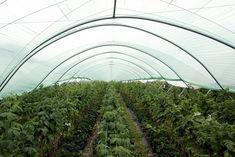
A multi-million pound Surrey-based soft-fruit farm stepped up its battle to secure its future following a landmark ruling on planning permission for polytunnels in December.
The Hall Hunter Partnership is actively seeking support from neighbouring communities for a new scaled-down scheme at Tuesley Farm.
The Milford farm operation, which accounts for 40 per cent of the business with an estimated annual turnover of £3.6 million, had three hectares of crops protected by polytunnels.
More than 80 members of the Tuesley Farm Campaign branded the 12-foot polytunnels a “gross intrusion” and prompted Waverley District Council’s decision to mount its legal challenge.
A High Court judge upheld enforcement notices issued by Waverley Borough Council, which required the removal of all the polytunnels together with the 45 caravans used to house up to 250 agricultural workers.
The Hall Hunter Partnership was given 12 months to comply and will be submitting a revised planning application this year in a bid to continue growing soft fruit at Tuesley Farm.
General manager David Kay told FPJ: “We have been working with Waverley District Council for 12 to 18 months and, now that we are clear that we need to obtain planning permission, this is our priority.
“We have sent out nearly 100 letters to residents asking for their input so we can take it all into account in fine tuning our application.”
The new scheme would “massively reduce” the visual impact of the polytunnels by cutting coverage down to 11 per cent of the farm area, Kay added.
“The blocks of covered crops would be broken up so there would be no more than 20 acres together and, using detailed 3D analysis of the landscape, we could choose the best places to put them,” he said.
Proposals to convert existing farm buildings into living accommodation would also reduce the number of caravans on the site.
Kay told FPJ: “We are asking for ideas on how we can combine state of the art environmental stewardship with the production of soft fruit. We want to be a positive part of the community.”
An environmental initiative at Tuesley Farm has also seen 10km of hedges and 10,000 trees restored to the site alongside beetle banks and barn owls.
But Kay warned the farm was not sustainable without polytunnels.
“My hope is that a well-crafted application for planning permission with a good definition for what it means for the future of Tuesley Farm will be successful,” he said



